
If it feels like you can’t compete for ad space with big brands and their big budgets, adjust your strategy. Here’s how to manage PPC for small businesses.
When a business enters a well-established market with thriving competitors, it faces many challenges in attracting new business and growing its brand awareness.
One reason small businesses struggle to gain traction is that large, well-established companies have enormous marketing budgets. Those budgets make it challenging for the smaller company to compete for pay-per-click (PPC) space.
However, small businesses can thrive with PPC when using the right strategy. And the great news is, that small businesses can do so without increasing their budgets to uncomfortable amounts.
Learn PPC for small business strategies for competing with big brands on a limited budget.
PPC offers a great opportunity for companies to get in front of their target audience at a time when they are looking for information and likely to buy. Additionally, the marketing tactic enables marketing teams to be very specific about how much they want to spend and the audience they want to spend it on. Here’s why PPC matters for businesses of all sizes.
If you’ve tried PPC and feel like it isn’t for a business of your size or budget, it’s time to try again with a new strategy. Here are some ways businesses with limited budgets can win big with online ads.
The competition for the most common keywords related to your products and services likely prices you out of placing ads on those terms.
For example, a new marketing agency in San Francisco likely won’t be able to afford the keyword for “marketing agency San Francisco.” But they can afford the term “marketing agency for insurance companies San Francisco.” And if they have vast experience working with insurance companies and can showcase how they’ve helped these companies grow, targeting that search term will produce better results anyway.
Long-tail keywords can help you target your landing pages. The more specific the keyword, the more you know about what your customer is looking for. This should help you highlight what makes your company unique and build a niche in even the most crowded marketplaces.
Although you’ll be using a greater percentage of your budget on long-tail keywords, you can still gain brand awareness on high-volume keywords. Just proceed with caution and set strict limits on high-volume keywords.
High-volume keywords can generate traffic to your site in a way lower volume keywords will not. But high volume also often means high price. That’s why you should put limits on spend for these keywords.
When targeting high-volume keywords, use these strategies.
You can run PPC ads on a variety of platforms, including Google, Bing and social media. Each platform will perform differently for various businesses because each platform houses a different audience or audience segment.
As you test PPC for your business, see which platform delivers the best results. Then lean more heavily on that platform with your budget. Watch your analytics though because a platform can go from the best for your ads to the worst. You should regularly reassess where your ad spend is going.
Often, businesses on a strict budget will use their website as the target for PPC ads. But your main website is likely too broad to convert individuals who are exploring their options in the early stages of the funnel.
Landing pages are highly targeted and can speak directly to a prospect’s needs. You have insights into what the prospect was searching for. Now use that data to customize the landing page experience.
Include an offer that is unique to the campaign and keep the language precise and targeted. This will help you capitalize on every click on your website.
Experiment with different layouts and creative to see what resonates with your audience the most.
As you start running PPC ads, you’ll see a flood of data. Many clicks on your ad might look like success. But you should focus on conversions.
To focus on conversions, you need to set up the analytics on your ads correctly and tell the ad platform what a conversion is. This crucial step is too often overlooked, and then businesses don’t understand how they should be optimizing their ads to see greater results.
Consider what phase of the funnel your customers are likely in based on the search terms. Make the conversion activity match the funnel phase. For example, if customers are just getting to know you, the conversion activity should not be to buy your product or service. It should instead focus on collecting your customer’s email address or phone number to begin nurturing the lead. Offer something in exchange for their contact information, such as a highly relevant eBook, custom demo, or video content they can’t find elsewhere.
PPC seems easy to get started with at first glance. But when it comes time to optimize your ads or determine what might be holding them back, PPC requires deep industry know-how and ongoing training to stay up on the latest updates and features available to advertisers.
If it feels like you can’t compete in your industry, work with the experts at New Light Digital. Our team has deep knowledge of PPC and can help you build an effective strategy for reaching your customers on the platform. Schedule your free consultation now to get started.
Further reading: